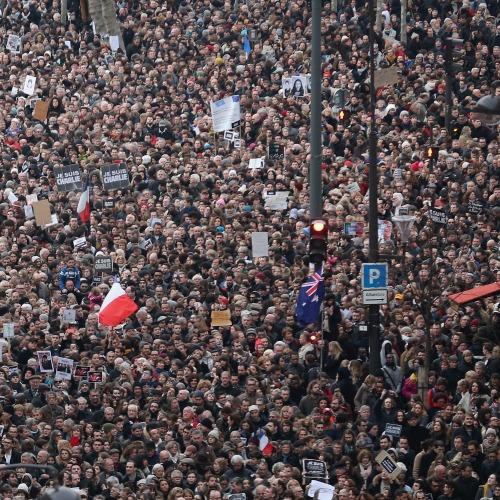BROOKE: On Wednesday with the calls of "Je Suis Charlie" still echoing throughout France, French stand-up comedian Dieudonne M’bala M’bala was arrested for posting the message “I feel like Charlie Coulibaly.” Coulibaly being the name of the terrorist who killed four people in the kosher supermarket last week. Now the cries of free speech for all are competing with charges of a double-standard. Celestine Bohlen is a columnist for the International New York Times, based in Paris. She gives us a little background on Dieudonne…
CELESTINE BOHLEN: He started associating with well-known Holocaust deniers. And he has taken this Holocaust denying, anti-Semitic speech on stage. And he has been repeatedly charged on the hate speech law. He has been fined repeatedly. And then last year after a comment that was directed at a Jewish radio personality…
BROOKE: He said of this talk show host, why am I thinking of ovens, or something like that?
BOHLEN: Right, exactly. And after that and several other incidents of the same type, the Minister of the Interior, who’s now the Prime Minister of France, Manuel Valls moved ahead with a restraining order to block his shows from opening.
BROOKE: So, prior restraint -- it’s a bridge crossed that hadn’t been crossed before. Stopping him from saying something, not prosecuting him after he said it.
BOHLEN: Absolutely. And he has become this kind of lightning rod among the young in the troubled suburbs where they feel that he is speaking out against Jews, and he’s being condemned for it. And Charlie Hebdo can print cartoons mocking Muhammad, and that’s okay.
BROOKE: Okay, so what makes one protected speech, and the other actionable?
BOHLEN: One main issue goes back to the secular nature of France, where really religion is fair game. You can attack or make fun, or criticize religious symbols, sometimes in offensive ways, to all religions concerned. Whereas what Dieudonne did was attack a group of people, in this case a group that shares a faith. But their religion really isn’t the issue here. He attacked not the faith but the followers. And that turns into a kind of an ethnic slur, which is where the hate speech law kicks in.
BROOKE: But, do you see any substance at all to the charge, which has gotten louder this week, of a double standard being applied by French justice.
BOHLEN: What’s interesting in France is that first rush to embrace the target of these attacks as freedom of speech, "Je Suis Charlie," that was all really about, "We defend our values. This is France. We have a particular kind of satire that we hold dear. It’s a value that defines us." And now, it’s sort of like coming out of a nightmare in a way. It was a nightmare the first few days. And people rallied to something that made them feel French, and proud to be French. You know, then with a little bit of distance, you’re beginning to sort of analyze some of these paradoxes.
BROOKE: Which brings me to an editorial last week in the newspaper Liberacion, which noted that the initial demonstrations in the wake of the tragedy, quote “Warmed our hearts, especially because they were accompanied by calls not to confuse France’s Muslims with the Islamic terrorists.” So, it seems the challenge here, Celestine, is to integrate the growing Muslim minority into France, without sacrificing such principles as separation of church and state and free speech. So, how’s that going?
BOHLEN: We focus a lot on the failures. There are successes, particularly the populations from North Africa who have now been here two to three, probably four generations. I think where the failure is striking is in the ability of the French establishment to give space to this population that’s here, that’s French, and it’s not going anywhere. For instance in the National Assembly, there’s this sort of remarkably few Muslim representatives. It’s kind of stunning, when you think that about 10 percent of the population is Muslim. There is great sensitivity among French Muslims that their religion somehow gets put down with more alacrity in the name of secularism than other people’s religions do. That said, there’s also an entire party - the National Front - that campaigns against immigration, that treats even native born French people but of a different culture as somehow a threat, and something that’s an attack on Frenchness, French identity.
BROOKE: And this argument now over double standard, is it a reflection of this deeper fissure?
BOHLEN: It is a reflection of the cracks in society. You know in fact tonight one of the newspapers had a headline saying, “The Parts of France that Aren’t Charlie.” You know, and I think that for those first six days, nobody was really focusing on that. Now they are. And one of the arguments that that part of France that considers itself not Charlie is bringing up this question of double-standards, is saying, you know, why does an attack on Jews get condemned. And an attack against the prophet not. It’s part of the debate. It’s out there on social media, especially among young people, particularly in those neighborhoods that are more troubled, and with a higher percentage of Muslim kids.
BROOKE: Marginalized.
BOHLEN: Yes. Young kids are confused, actually, because, some of these things are not so easy. In the name of Secularism, it’s alright to offend your prophet. They don’t get it. It’s not an easy thing to wrap your mind around.
BROOKE: Celestine, thank you very much.
BOHLEN: Thank you very much.
BROOKE: Celestine Bohlen is a columnist for the International New York Times. She spoke to us from Paris.
(music)

